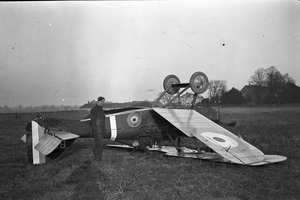[Received February 22, 1918]
#22
Royal Flying Corps,
London Colney
Jan. 21, 1918.
Dear Mother and Father:
I will now attempt to finish up No. 21. I am enclosing 5 photos of myself. You will observe from the scratches and blurred focus that I always managed to bust the camera. I am sure you will like them. The sun is in my eyes in all of them. I think they are very flattering.
I had a good flight this morning. Learned something about landing the bus. I am scheduled for a flight tomorrow.
I had my shutter mechanism all apart today and fixed it. Now I am going to calibrate the focus scale and then I will be all ready for taking more pictures. I’ll have to postpone that list of titles, it is a big clerical job.
I received a Christmas card with notes from Rose. She is not going to be married until after the war, rather definite prospects. I wrote her a letter yesterday.
Now to go back to London. Rit arrived while I was talking to Frank. Rit and I went to a famous restaurant where American troops are not restricted by the ration regulations. We had a fine dinner for $1.50. Then we dropped into a bum movie until it was time for me to catch my 10 o’clock train.
The warm air was making a wonderful thick fog from the snow in the country. I could not see hardly anything when I got off the train, but decided to try my luck at finding the cross country route, which I had been over twice before, to the airdrome. I found the various paths, lanes, gates and woods and went alright until I tried to cross the aerodrome. Here I lost all land marks and walked in a big circle. You can’t imagine how hard it is to steer a straight course over 4 inches of trackless slush on a black night in a thick fog. I must have walked two miles in my circle. I finally came to a border of the airdrome, could make out hedge and a couple of trees but did not know where they were; so guessed I should go to the left and followed the border around until I came to the road to camp.
We have had two concerts of note, given by charitable and talented war workers, in the men’s recreation Hut. One troop of two girls who sang, one who played the piano, and two men who sang, was the cleverest entertainment I have seen in England. Last Saturday we were entertained by a troop of about 10 girls. Some of them sang very well.
Friday there was a good dance at St. Albans. About 15 from this squadron attended. Paskill and I walked up in the afternoon and had dinner with four other Americans. The dance was a very high class affair. It was arranged by several titled ladies, and the girls were the best I have seen in England. All the men were British officers or American cadets. Some of the girls were wonderful looking and very good dancers. But the English girls don’t seem to have any enthusiasm or special interest, or I might say intellectual charms. Probably I bored them, anyway I was greatly disappointed. They are doing wonderful work, and if it were not for them the British army would be vanquished. Can you imagine daughters of Sirs and Ladies going to work the next morning in munition factories? The tables were just reversed from my shipyard days. I had nothing to do the following day but go to a 8:50 parade. We danced until 2:45 a. m., and most all the girls had to go to work early that morning. “Pask” and I stayed at the hotel in St. Albans all night and then walked to camp in the morning.
Jean invited Ted (Brown) and I to a dance in London next Wednesday night and we expect to go.
Love to you all,
Parr

Parr’s letter no. 21 appears to have gone missing (or been suppressed by the censor). In his letter of March 17, 1918, he hopes it has been received; on May 4, 1918, he reports that his father says it was not received.